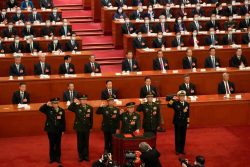
Britain’s Deputy Prime Minister Dominic Raab arrives at 10 Downing Street in London, Tuesday, Jan. 18, 2022.
11:35 JST, April 22, 2023
LONDON (AP) — U.K. Deputy Prime Minister Dominic Raab grudgingly resigned Friday after an independent investigation found he bullied civil servants, though he criticized the findings as “flawed.”
Raab’s announcement came the day after Prime Minister Rishi Sunak received the investigation report into eight formal complaints that Raab, who was also justice secretary, had been abusive toward staff members during a previous stint in that office and while serving as Britain’s foreign secretary and Brexit secretary.
Attorney Adam Tolley, who conducted the inquiry and noted that “bullying” was not a legal term, found Raab “acted in a way which was intimidating,” was “unreasonably and persistently aggressive” and “introduced an unwarranted punitive element” to his leadership style.
“His conduct also involved an abuse or misuse of power in a way that undermines or humiliates,” Tolley wrote in the 48-page report.
Raab, 49, denied claims he belittled and demeaned staff and said he “behaved professionally at all times.”
He remained defiant in resigning, saying he was “duty-bound” after promising to do so if the bullying complaints were substantiated. He said the inquiry made two findings of bullying against him and dismissed the others.
He made it clear in his resignation letter that he did not accept the findings, calling them “flawed” and saying the inquiry “set a dangerous precedent” by “setting the threshold for bullying so low.”
In a letter praising much of the work that Raab had done, Sunak said he accepted the resignation “with great sadness.” He also referred to “shortcomings” in the investigation, which he said had “negatively affected everyone involved.”
Sunak appointed Oliver Dowden, a senior Cabinet official, as deputy prime minister, and Alex Chalk as justice secretary. Government websites were quickly updated with the replacements and their photos.
The resignation spared Sunak the difficult task of deciding the fate of his top deputy.
If he had fired Raab, he would have faced more criticism for appointing him in the first place despite reportedly being warned about Raab’s behavior; if he had kept him in the job, he would have been blasted for failing to follow through on his promise to restore integrity to the Conservative government.
Sunak’s spokesperson Max Blain, speaking before Raab’s resignation Thursday, said the prime minister still had “full confidence” in his deputy while he reviewed the report and weighed whether he violated the ministerial code.
The code of conduct requires ministers to treat people with respect and to have proper and appropriate relationships with colleagues, civil servants and staff. It says harassment, discrimination and bullying will not be tolerated.
Blain said Friday that Raab made the right decision to resign because any bullying was unacceptable. He dodged a question of whether Sunak would have sacked him if he didn’t step down.
Jill Rutter, a senior fellow at the Institute for Government think tank, said Sunak’s decision not to fire Raab allowed his deputy — who was unlikely to go quietly — to criticize the report’s findings, rather than his boss. Instead, Raab hailed Sunak as a “great prime minister” and pledged support from the backbenches of Parliament.
Rutter said Sunak missed an opportunity to send a message about what he expects from his cabinet.
“He could have in a sense done more for that if he’d said, ‘I’m not gonna give you the option of resigning, I am going to sack you because you’ve fallen below the standards I want to set for the way I run my government,’” Rutter said.
Sunak’s delay in not acting swiftly, as he had promised, gave his political opponents an opportunity to attack him for dithering.
“What I think this shows is the continual weakness of the prime minister,” opposition Labour leader Keir Starmer told broadcasters. “He should never have appointed him in the first place, along with other members of the Cabinet that shouldn’t have been appointed, and then he didn’t sack him. Even today, it’s Raab who resigned rather than the prime minister who acts.”
First elected to Parliament in 2010, Raab unsuccessfully sought to become Conservative Party leader in 2019 before throwing his support behind Boris Johnson. Appointed deputy prime minister under Johnson, he briefly took charge of the government when Johnson was hospitalized with COVID-19 in April 2020.
Raab said in his letter that he had “not intentionally belittled anyone” and was “genuinely sorry for any unintended stress or offense that any officials felt.”
He noted the inquiry concluded he had not “sworn or shouted at anyone, let alone thrown anything or otherwise physically intimidated anyone.”
The bullying inquiry is the latest ethics headache for Sunak, who vowed to restore order and integrity to government after three years of instability under predecessors Johnson and Liz Truss. Multiple scandals brought Johnson down in summer 2022, and Truss quit in October after six weeks in office when her tax-cutting economic plans sparked mayhem on the financial markets.
But Sunak has struggled to shake off opposition allegations that the Conservative government remains mired in scandal and sleaze, and he is now facing an investigation himself.
A parliamentary watchdog announced this week that he was looking into whether Sunak properly disclosed his wife’s interest in a company that stands to benefit from a massive boost to free child care in his administration’s budget.
A member of Sunak’s Cabinet, Gavin Williamson, quit in November over bullying claims. In January, Sunak fired Conservative Party chairman Nadhim Zahawi for failing to come clean about a multimillion-dollar tax dispute.
A separate inquiry is underway into claims Johnson secured a loan with the help of a Conservative donor, Richard Sharp, who was later appointed chairman of the BBC.
Before Sunak’s office released the Tolley report, the right-leaning Daily Telegraph posted a vigorous defense written by Raab in which he said he had endured a “Kafkaesque saga” and that civil servants had tried to force him from office.
Asked later by the BBC if he was a “nightmare” to work for, Raab said that a very small minority of passive-aggressive “activist civil servants” tried to block his reforms and that he got along with thousands of other public employees.
The report noted that Raab had been able to regulate his “abrasiveness” after the investigation was announced.
“He should have altered his approach earlier,” Tolley wrote.
Top Articles in News Services
-

Survey Shows False Election Info Perceived as True
-

Hong Kong Ex-Publisher Jimmy Lai’s Sentence Raises International Outcry as China Defends It
-

Japan’s Nikkei Stock Average Touches 58,000 as Yen, Jgbs Rally on Election Fallout (UPDATE 1)
-

Japan’s Nikkei Stock Average Falls as US-Iran Tensions Unsettle Investors (UPDATE 1)
-

Japan’s Nikkei Stock Average Rises on Tech Rally and Takaichi’s Spending Hopes (UPDATE 1)
JN ACCESS RANKING
-

Producer Behind Pop Group XG Arrested for Cocaine Possession
-

Japan PM Takaichi’s Cabinet Resigns en Masse
-

Man Infected with Measles Reportedly Dined at Restaurant in Tokyo Station
-

Israeli Ambassador to Japan Speaks about Japan’s Role in the Reconstruction of Gaza
-

Videos Plagiarized, Reposted with False Subtitles Claiming ‘Ryukyu Belongs to China’; Anti-China False Information Also Posted in Japan























